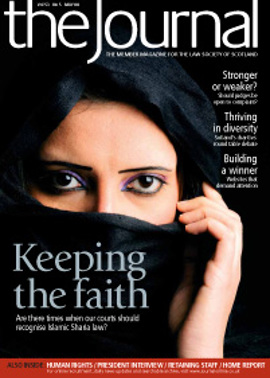Soft law, hard edge?

Legal, financial, reputational, and operational risks to business are inextricably intertwined. This is particularly true in the field of business and human rights, where commercial lawyers must be coaxed out of their hard-law comfort zone to appreciate the multifaceted nature of the challenges and the response.
The stories linking companies with human rights abuses are well documented. The damage to Shell’s reputation when protester Ken-Saro Wiwa was executed by the Nigerian government is now a classic business school case study. BP in Colombia, Google and Yahoo in China, and Nike and GAP in Asia, have all suffered the consequences of exposed abuses. In recent weeks, sponsors of the Beijing Olympics have been called on to condemn China’s oppression of pro-Tibet demonstrations and failure to pressurise trading partner Sudan to end atrocities in Darfur.
When companies operate in sensitive parts of the world, where human rights violations are systemic and governments unwilling or unable to fulfil their responsibilities, the challenges and risks become acute. A company may confront labour, contractor and health and safety standards, and security and environmental issues, as well as demands to fulfil needs of the local community.
This is more than a call for philanthropy or legal compliance. It is a call for business as an economic and social actor wielding unprecedented power, to step up to the plate of new responsibilities. It also represents a shift from “bottom line” to “triple bottom line”: people, planet and profits.
Over the past decade there has been a momentum towards defining corporate human rights responsibilities. Globalisation, the privatisation of political power and the lack of a coherent legal framework have created a gap permitting corporate-related human rights abuses to occur. Accountability has been in the courts of public opinion, aided by an active civil society and global communications, rather than in the law courts. What we are now seeing is the coming together of an international response to this governance
gap whereby states and companies will be held accountable for violations.Developing legal enforcement
The point of departure is the international human rights framework. The Universal Declaration of Human Rights, the International Covenant of Civil and Political Rights, and the International Covenant of Economic Social and Cultural Rights, form the core. These place legally binding obligations on states, but cannot be directly translated for business, which does not carry the same responsibilities.
The reach of the law to protect against corporate-related human rights violations at both international and national level has been piecemeal to say the least, although societal norms and expectations are now propelling innovative developments.
In the US, the Alien Tort Claims Act has been used where multinationals have committed human rights violations abroad (most notoriously the Unocal case for abuses in Burma). In a House of Lords case, Lubbe v Cape plc (No 2) [2000] 4 All ER 268, the Lords permitted a workers’ case against the company for asbestos-related injuries to continue in the English courts, as the South African courts were not found to be a viable alternative due to lack of legal aid and legal representation. There is thought to be scope for jurisdictions to develop the use of extra-territoriality to hold multinationals accountable.
A further pioneering use of the law in the US was seen in Kasky v Nike, where an activist claimed that Nike made false statements over sweatshop labour in supplier factories. Again, there is considered to be scope in other jurisdictions to transform not just CSR reports but voluntary codes of conduct into standards to which companies can be held legally accountable.
In some countries the law seeks to provide incentives for companies through the concept of corporate culture, where policies, rules and practices are taken into account in deciding corporate criminal liability and sentencing.Meanwhile, businesses anxious to protect their reputation have used contractual terms to ensure human rights compliance by suppliers, thus shifting the issue from voluntarism to legal obligation. Increased privatisation of public services also opens the opportunity for government to use its purchasing and contractual power to include social considerations in procurement criteria.
In the UK, the Companies Act 2006 requires directors to “have regard” to matters such as “the impact of a company’s operations on the community and the environment”. It also imposes a degree of CSR reporting for UK-quoted companies, potentially encouraging closer scrutiny of suppliers and partners.
Internationally, the developing hard-law for business is likely to include liability under criminal law. The legal concept of complicity, the indirect involvement of companies in human rights violations, may give rise to criminal and non-criminal liability. So may the International Labour Organisation (ILO) Convention on Forced Labour, criminalised in most jurisdictions, but with relatively few prosecutions. This may change however with the ILO undertaking the training of judges.
Plugging the gap?
These legal developments are significant but disparate. Various voluntary initiatives have sought to plug the gap by defining the role of business and putting standards in place, as expected by stakeholders. The UN Norms for Business, adopted in 2003, attempted to do this but ultimately failed to get traction with either business or non-governmental organisations.
Some sectors have developed standards on core issues such as the Voluntary Principles for Security and Human Rights, and the OECD Guidelines for Multinational Enterprises.
The ILO has developed explicit guidelines for companies, and the IFC and World Bank funding requirements include social risk assessments, but none of these initiatives take on board the full spectrum of rights. The UN Global Compact brings together around 4,000 participant companies to support principles in the areas of human rights, labour, the environment and anti-corruption, but is criticised for lack of enforcement.
Despite the proliferation of such initiatives, until now there has been a lack of focal point and overarching framework signed up to and supported by all.
Towards a common framework
A major milestone comes in the form of the recently published report by the UN Secretary General’s Special Representative for business and human rights, Professor John Ruggie, “Protect, Respect and Remedy: A Framework for Business and Human Rights”. This is likely to be adopted in June by the Human Rights Council and is significant in allowing the adoption of a substantive position on the current and potential future responsibilities of both states and companies.
Ruggie recognises that there is a state duty to protect against abuses by non-state actors, including business. The UN treaty-monitoring bodies recommend that states take all necessary steps to protect against abuse, including to prevent, investigate and punish the abuse, and to provide access to redress.
The report also highlights the corporate responsibility to respect human rights as a baseline expectation that they do no harm. It cites business organisations such as the International Organisation of Employers, and International Chamber of Commerce, who recognise that companies “are expected to obey the law, even if it is not enforced, and to respect the principles of relevant international instruments where national law is absent”.
Managing business’s responsibility
Companies must now rise to the challenge of ensuring they meet this duty to respect not only legally binding standards, but those that have come to be expected by stakeholders, giving them the “social licence” to operate. It is arguable that a “do no harm” line may be insufficient to meet these demands, as business is often called upon to demonstrate how it is a force for good, and may be required to contribute to the promotion and fulfilment of rights.
The experience of many companies is that taking a proactive approach to managing human rights can turn social risk into business opportunity. Cairn Energy did so with the problem of water scarcity in Rajasthan, where water was required for operations but safe drinking water for the community was in short supply. This involved risk assessment analysis of Cairn’s responsibilities within its spheres of influence, and stakeholder engagement to reach an agreed framework of shared responsibilities and roles with the state administration.
To ensure respect for human rights is a challenge for any well-intentioned company, and cannot be neatly dealt with by a CSR or sustainability director, human resources, or other manager or legal adviser alone. A coordinated, often top-down, approach is required and the role of lawyers, in a field which is legal at its core and ultimately legal in its reach, should not be underestimated.
The UN report recommends to companies a process of “due diligence” (note the choice of term as explicitly legalistic). This process is identified as requiring a human rights policy, impact assessments, integration and a monitoring and tracking process.
Companies should now consider adopting these practices to avoid allegations of abuse or complicity. Some sectors already conduct environmental or social impact assessments, which may inherently include human rights-related impacts but may not address all projected issues across a company’s sphere of influence. A consensus around human rights impact assessment methodologies is being reached and can be expected to be gradually introduced into management systems around the globe. Ruggie’s last report stated that “No single measure would yield more immediate results in the human rights performance of firms than conducting such assessments where appropriate”.
Much of the debate over the past decade has been around the efficacy of voluntary initiatives and the need for a binding regulatory framework. Ruggie has moved this debate on, defending voluntarism while paving the way for new standards of intervention to emerge, allowing no party off the hook.
So for now, business and human rights may be broadly characterised as soft-law in nature but with a hard edge of reputational and legal risk. The UN report, however, signposts the potential for a future increasingly characterised by hard-law and legal consequence combined with a softer edge of voluntary leadership. The next generation of commercial lawyers and advisers can expect to play a part in this shift, as business enters new markets and is compelled to take a proactive approach to human rights challenges.
In this issue
- Up for the challenge
- Paralegal regulation - why?
- Faith in the law
- ARTL: The Full Monty
- Giving their all
- Full of the joys of spring?
- A backward advance
- Sheriffs behaving badly
- Summary trials: deciding the facts
- Soft law, hard edge?
- Hands-on chief
- A new framework for Europe
- The ABCs of SEO
- Creating an award winning legal website
- This means war
- Feeling the draft?
- Audience on your side
- The reason of age?
- The benefit burden
- Signing away family rights
- Scottish Solicitors' Discipline Tribunal
- Website reviews
- Book reviews
- A better buy
- Tenders: a better way






